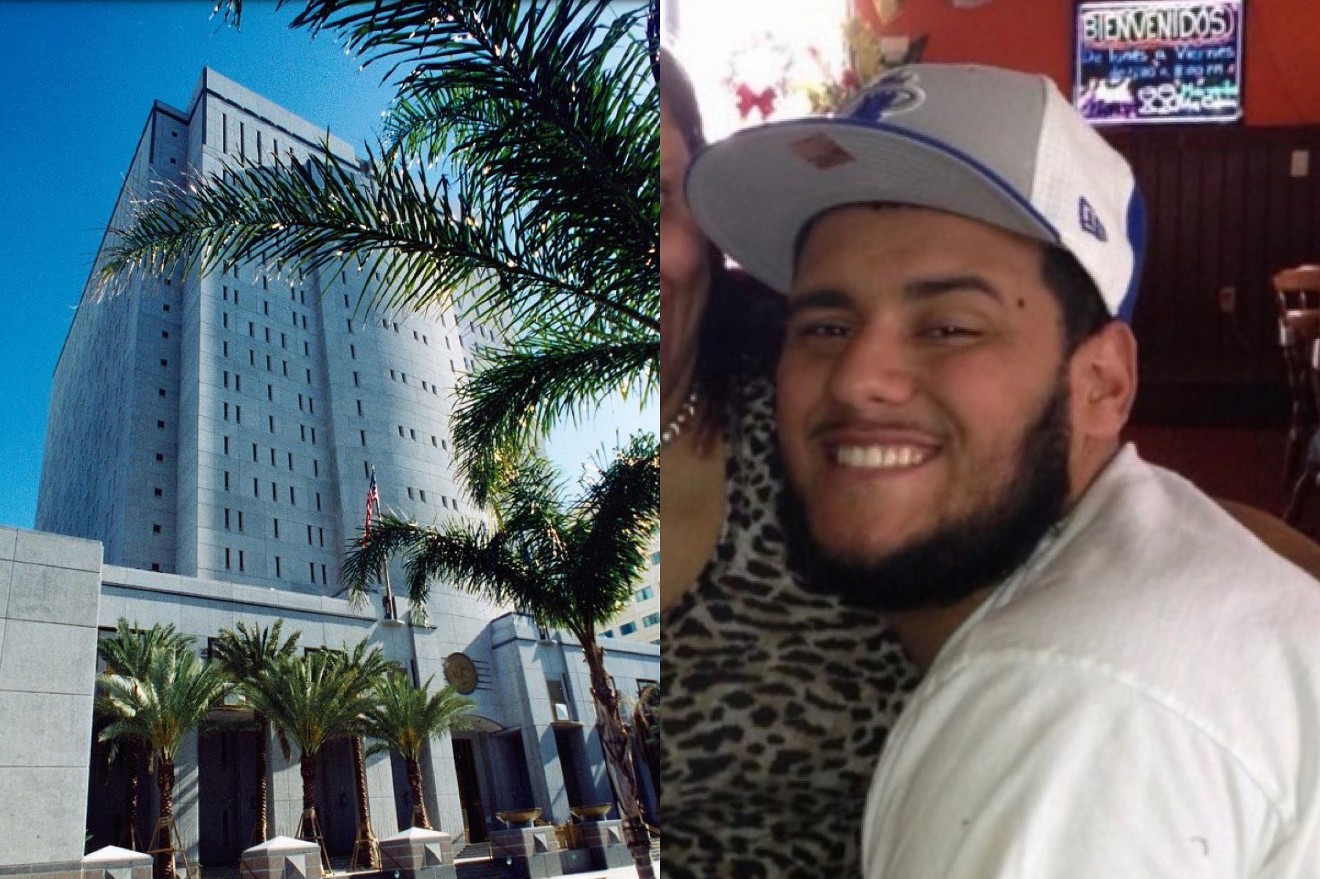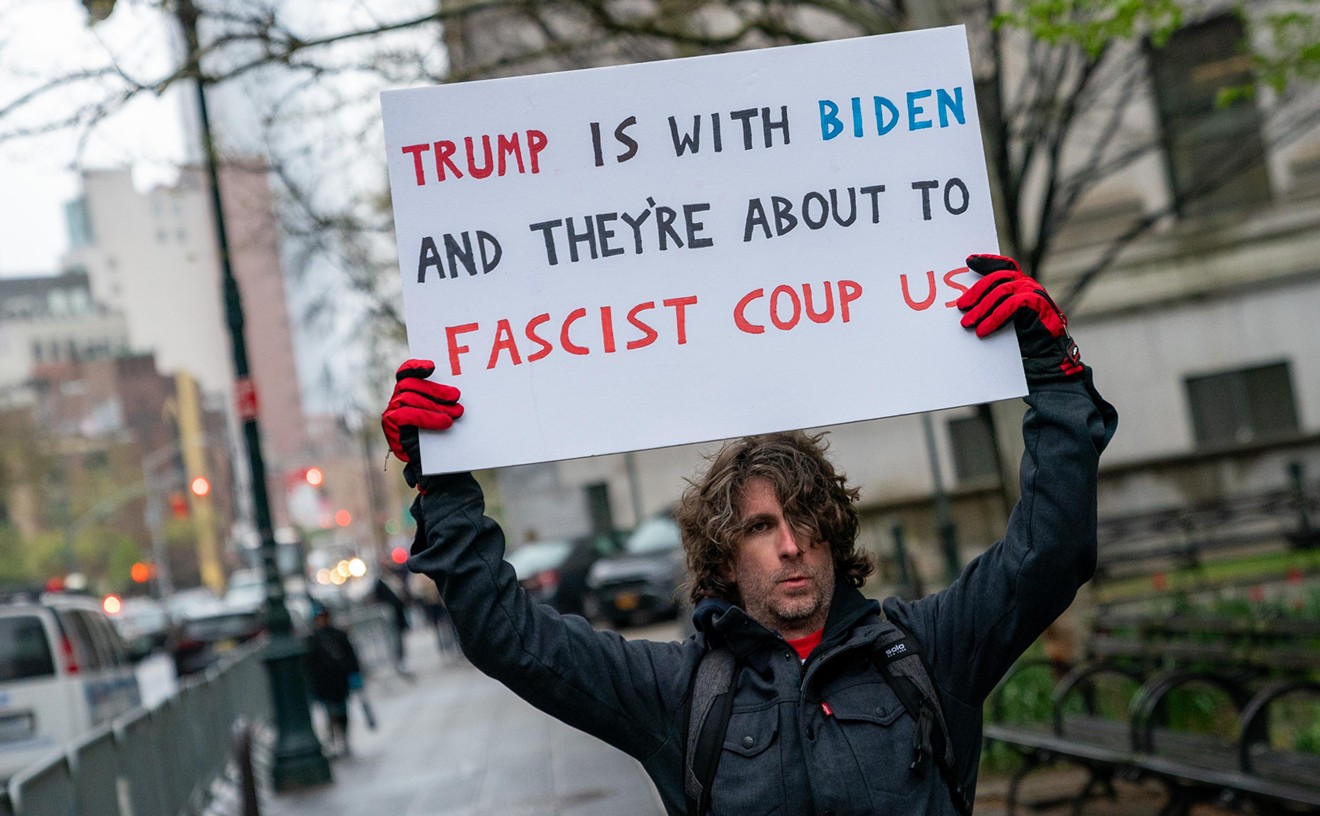Doctors at the University of Miami's Bascom Palmer Eye Institute believed Cabrera had a condition called myasthenia gravis, a rare autoimmune disease marked by muscular weakness and rapid fatigue. But additional tests were needed to confirm the diagnosis and come up with a treatment plan
Then he wound up in pretrial detention.
More than 18 months later, Cabrera's pleas to prison officials to see a neurologist for his worsening condition have been ignored, according to his attorney, Paul Petruzzi. The once-brawny 32-year-old is declining quickly, Petruzzi says, and is now in a wheelchair, experiencing facial paralysis, and going blind in both eyes.
"At this point, he has deteriorated so fast," Cabrera's girlfriend says in a teary phone call. She requested that New Times withhold her name for fear of retaliation. "We're scared of two things: It can be the end of his life, or it could leave permanent damage to all his nerves."
Staff at FDC Miami contend that inmates at the facility lack basic medical treatment owing to a severe staffing shortage: Some staff members estimate that 30 to 50 percent of FDC Miami's medical positions are currently vacant. Mary Melek, the chief shop steward for the local union that covers employees at FDC Miami, says the prison is short on manpower in almost every department, especially among case managers, correction officers, and medical professionals."An officer had it so bad she was telling our administration to ask the National Guard for help."
tweet this
"From what I’ve observed, our medical teams are so short-staffed that these inmates are getting overlooked. Medical has to prioritize who they see because they're short on doctors," Melek tells New Times, adding that she has reported several instances where an inmate's medical needs have been ignored.
Multiple factors led to the staffing shortage, Melek says — from the pandemic to a Trump-era federal hiring freeze to the rising cost of living in Miami. She says these factors have created a dangerous and untenable situation for inmates and personnel alike.
"An officer had it so bad she was telling our administration to ask the National Guard for help," Melek says. "Corrections officers are getting so burned out that they don't care about overtime pay because the work is wearing them down."
In an email response to New Times, U.S. Bureau of Prisons (BOP) spokesperson Benjamin O'Cone says the BOP is looking to remedy its staffing problems.
"Despite challenges posed by the pandemic, we have managed our staffing levels to maintain the safety and security of our staff and inmates, while providing appropriate opportunities for inmates to enhance their successful reentry into the community upon release," O'Cone writes. "We are actively seeking to fill vacant positions."
According to Melek, inmates who are requesting medical care sometimes go days and weeks without getting treatment because there isn't enough medical staff to see them, nor case managers to perform check-ins.
Case managers are tasked with assessing and handling inmates from the time they arrive at the prison to the day of their transfer or release. They make sure an inmate's needs are being met, and enroll inmates in programs, such as job training and education, to help them re-enter civilian life when they're released. But case managers, who once oversaw roughly 150 inmates before the pandemic, now must keep track of 200 to 350 inmates. Because it can take days or weeks for an inmate to meet with a case manager, inmates find themselves missing crucial enrollment deadlines through no fault of their own.
"In corrections, we're supposed to 'correct' people by helping them and giving them programs," Melek argues. "But if we can't get inmates enrolled quick enough, it increases recidivism and harms their chances of succeeding on release."
In some cases, she explains, inmates are left in solitary confinement for longer than they should be, or they miss transfer dates out of the prison because their case managers are so overwhelmed. Last month, a staff member at FDC Miami filed a civil rights complaint with the U.S. Department of Justice's Office of the Inspector General (OIG), alleging severe civil rights violations as inmates are deprived of even their basic needs, owing to the staffing crisis.
"Inmates who are diabetics, hypertensives, cardiomyopathy and HIV are not being provided their medication. It was reported over 750 prescriptions remain unfilled," reads the complaint, which was obtained by New Times. "In addition, toilets, several showers are inoperable, hot water is not working in some areas of the prison, no toilet paper or bar soap, bedding, towels, shower slides, masks to protect COVID exposures, etc."
The OIG responded to the complaint, stating it could not open an investigation and recommending that the employee refile the complaint with the Bureau of Prisons' Department of Internal Affairs.
O'Cone disputes Melek's claims of a staffing crisis and inadequate medical care.
"Inmates in the BOP, including FDC Miami, have daily and regular access to medical care. The BOP provides essential medical, dental, and mental health services in a manner consistent with accepted community standards for a correctional environment," the BOP spokesperson writes. "Each inmate is independently treated on a case-by-case basis, and treatment is provided as clinically indicated, including referrals to specialists in the local community. Appointments with specialists in the community are subject to the same scheduling availability afforded to members of the public."
Emery Nelson, another BOP spokesperson, declined to comment on Cabrera's case to New Times, citing "privacy, safety, and security reasons."
"The BOP does not discuss information on any individual inmate's conditions of confinement including medical care or medical condition," Nelson writes in an emailed statement.
But according to medical records attached to an emergency motion for Cabrera to receive outside medical treatment, he has requested medical treatment at least five times since October 2021 for his worsening eye condition.Some inmates turn to illicit drugs to self-medicate.
tweet this
On October 26, 2021, Cabrera wrote to medical staff that he'd been suffering from a droopy eye since being incarcerated in 2020, and that his vision was deteriorating. "I have already written to you awhile [sic] back to see a doctor and I have yet to be seen," Cabrera wrote. "Please have a Doctor see me ASAP and Thank you."
In a brief message on November 1, 2021, he wrote: "my eyes hurt."
Another request, sent on November 9, 2021, reads: "I have been requesting to be seen and still have yet to be seen. Please and thank you."
On November 23, he wrote that he felt he had "exhausted reaching out to almost every department.... I really would like to be seen by someone as I am very worried about my health and life.... Please & Thank you."
In Petruzzi's January 24 emergency motion for outside medical attention, the attorney stated that Cabrera's condition had deteriorated to the point where it was interfering with his ability to communicate with his counsel — a violation of the Sixth Amendment — and had created a "grave personal health risk."
"Mr. Cabrera’s speech is slurred, his left eyelid and face are drooping, and he has weakness in his arms and legs," the motion reads. "The Bureau of Prisons has yet to provide medical treatment for Mr. Cabrera either because it cannot, or it will not."
Mary Melek, the local union steward, says tensions at FDC Miami are on the rise as the lack of basic care leads some inmates to turn to illicit drugs to self-medicate.Uncertified officers don't have the training to deal with high-security inmates in a hospital setting.
tweet this
"If you're not getting treatment, you're gonna become violent against staff," Melek explains.
And it's not only the medical staff that's overwhelmed, says Eric Speirs, president of the prison workers union at FDC Miami. Speirs tells New Times the staffing shortage extends to corrections officers and transport personnel. It has become so dire, he says, that corrections officers who do not have Basic Prison Transport Certification (BPT) have been ordered to escort inmates on hospital trips — a violation of prison policy. This can be dangerous for staff and the general public in some instances, Speirs explains, as uncertified officers don't have the training to deal with high-security inmates in a hospital setting.
"I'm concerned and afraid for my bargaining-unit members being placed in a situation where they are going out there without proper training," Speirs adds. "If something happens, the agency will let them out to dry. It's beyond egregious to do that, for the safety of Miami-Dade County."
The FDC Miami workers union filed a grievance about the uncertified hospital transports.
In a letter responding to the grievance that was obtained by New Times, FDC Miami Warden E.K. Carlton admitted that the BPT staff list was exhausted and the administration needed to move staff around to cover the staffing emergency.
"Research into this matter determined due to a shortage of qualified BPT staff, numerous staff on annual leave and the amount of inmates at the outside hospital during the holiday season created a difficult task to provide adequate coverage," Carlton wrote.
O'Cone tells New Times that all staff is trained equally in law-enforcement duties.
In late April, Cabrera and two other purported leaders of a Little Havana drug-trafficking gang were found guilty on federal gun, drug, and money-laundering charges.
As Cabrera awaits his sentencing, scheduled for August, his girlfriend worries about what condition he'll be in by then. If you ask her, there's more to the negligence than understaffing.
"I do not believe short staff is the reason behind this medical neglect," Cabrera's girlfriend says. "I just simply believe the jails do not care for the human rights of an inmate."













